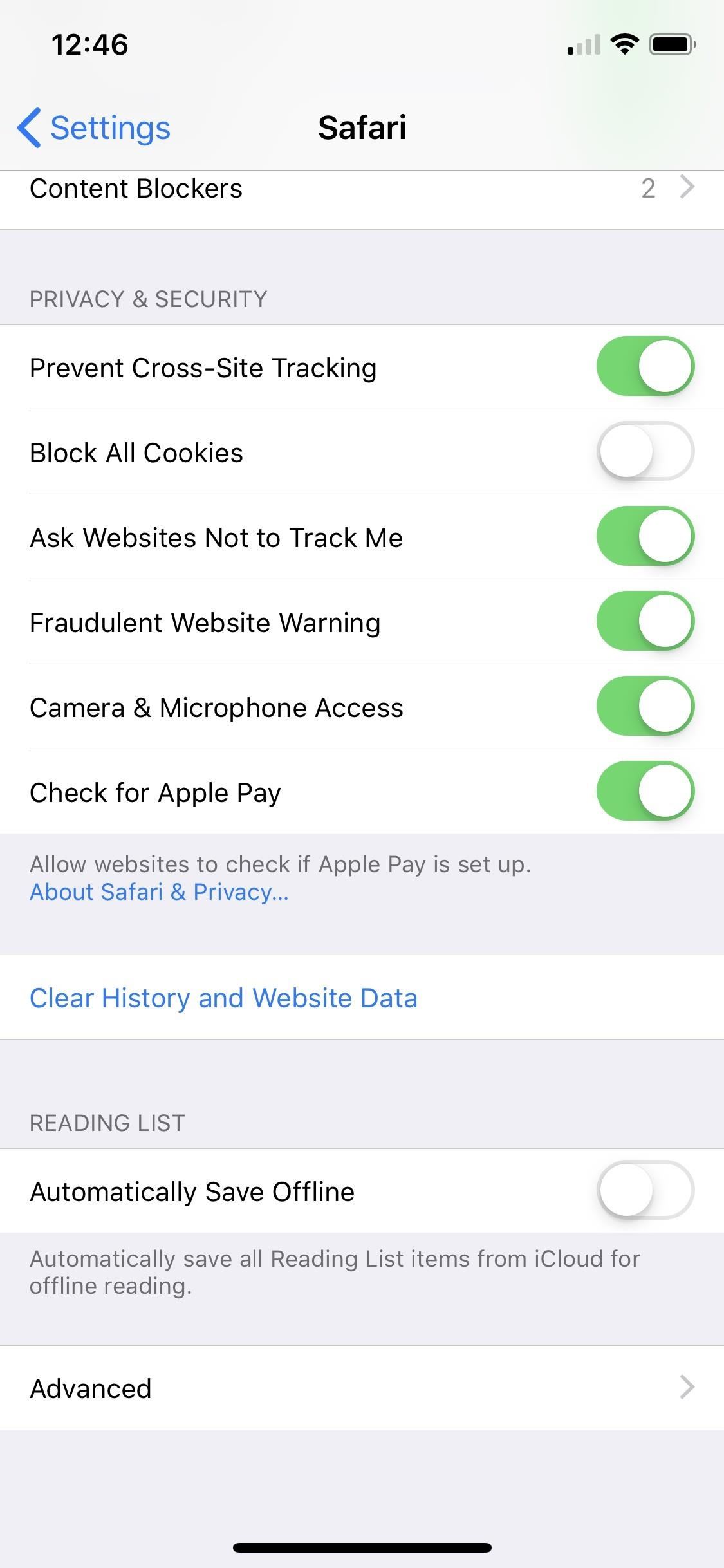News: Apple's Ditching the 'Do Not Track' Option for Safari in iOS 12.2
Apple first added the "Do Not Track" option to Safari in iOS 7, which sent a request to site owners and advertisers to not track your browsing activity. By tracking your activity, those third-parties could tailor content to you that you're more likely to interact with. While the feature was always opt-in, it's no longer a feature at all in iOS 12.2 on your iPhone.Release notes for Safari 12.1, the app version that is included in iOS 12.2, clearly state that "Do Not Track" has been removed from Safari's settings. The reasoning is because the standard is expired, therefore serves no purpose but to allow third-parties to fingerprint your device and use information.Removed support for the expired Do Not Track standard to prevent potential use as a fingerprinting variable.Do Not Track's usefulness entirely depended on the third-parties that it was sending the signal to since it was not a mandatory request. Web apps, advertising networks, analytics companies, plug-in providers, and other parties hiding on the web could easily ignore the signal sent by Safari to not track your browsing activity, and it was easy for them since there was no universally-agreed upon DNT standard. Google, Facebook, and Twitter have all been known to ignore DNT requests.Don't Miss: New iOS 12.2 Features for iPhone You Don't Want to Miss Since the Do Not Track request header has been largely ignored by most websites, and because of its seldom deployment, the World Wide Web Consortium, the main international standards for the web, withdrew further consideration for the standardization of the tracking-protection expression in January 2019. The Safari settings in iOS 12.1.3 (left) vs. iOS 12.2 (right). While it's sad to see this feature go, it was never really more than the equivalent to a "Protected by ADT" sign on the lawn of your house. Yes, robbers and trespassers would see, but if there's something they really want in your home, they're going to try and get it. The only difference is, acquiring your browsing activity is not illegal.Plus, Apple had already implemented "Intelligent Tracking Prevention" in iOS 11 and higher, which put restrictions on how third-parties can use first-party cookies, effectively limiting the use of cross-site scripting when browsing the web. Safari 12.1's release notes also mention a few more Safari-related updates, which improves the overall performances of Intelligent Tracking Prevention.Removed support for partitioned cookies for domains with cross-site tracking capabilities. The Storage Access API now provides third-party access to cookies. Improved Intelligent Tracking Prevention to limit long-term tracking based on client-side first-party cookies and to verify partitioned cache entries.Don't Miss: 30 Privacy & Security Settings in iOS 12 You Should Check Right NowFollow Gadget Hacks on Pinterest, Reddit, Twitter, YouTube, and Flipboard Sign up for Gadget Hacks' daily newsletter or weekly Android and iOS updates Follow WonderHowTo on Facebook, Twitter, Pinterest, and Flipboard
Cover photo and screenshots by Justin Meyers/Gadget Hacks
Apple's Ditching the 'Do Not Track' Option for Safari in iOS 12.2 «iOS & iPhone :: Gadget Hacks. النصائح والحيل 5 Views
20+ Features Coming to Safari in iOS 13 You Won't Want to
Apple has decided to ditch the Do Not Track feature in Safari, pretty much because it has no real benefit to the user. As a result, the latest Safari versions on both mobile and desktop no longer
Safari Loses 'Do Not Track' as Apple Focuses on Intelligent
Apple first added the "Do Not Track" option to Safari in iOS 7, which sent a request to site owners and advertisers to not track your browsing activity.By tracking your activity, those third-parties could tailor content to you that you're more likely to interact with.
Apple's Ditching the 'Do Not Track' Option for Safari in iOS
Apple to remove Do Not Track option from Safari in iOS and MacOS The setting in Safari that tells websites not to track you will soon be gone. But Apple has its reasons.
Apple's Ditching the 'Do Not Track' Option for Safari in iOS
Apple has revealed that it will be ditching "Do Not Track" in the upcoming version of its browser, Safari 12.1. The company will instead focus on Intelligent Tracking Prevention with the
Apple is removing the Do Not Track toggle from Safari, but
Apple's Ditching the 'Do Not Track' Option for Safari in iOS
Safari's now the only major browser supporting Do Not Track on iOS Due to the limitations Apple puts on third-party web browsers for iOS, Chrome and Firefox effectively can't offer Do Not Track on
How to Enable "Do Not Track" in Safari on iPhone & iPad
osxdaily.com/2014/02/12/enable-do-not-track-safari-ios/
How to Enable "Do Not Track" in Safari on iPhone & iPad. iPhone and iPad users have the option to enable a "Do Not Track" setting on their iOS devices for Safari, a feature that is aimed at limiting targeting and tracking of web browsing behavior by various web services.
Apple is removing the Do Not Track toggle from Safari, but for a good reason is part of the upcoming iOS 12.2 and macOS 10.1.4—Apple will be removing the toggle Apple will add options as
Safari's now the only major browser supporting Do Not Track
News: Apple's Ditching the 'Do Not Track' Option for Safari in iOS 12.2 How To: Auto-Fill Credit Card Forms Using Your iPhone's Camera in iOS 8 News: Top 9 New Safari Features in iOS 12 for iPhone News: Safari Security Breach Fixed in iOS 10.3 Update
Apple Kills Off "Do Not Track - news.softpedia.com
Apple first added the "Do Not Track" option to Safari in iOS 7, which sent a request to site owners and advertisers to not track your browsing activity. By tracking your activity, those third-parties could tailor content to you that you're more likely to interact with.
Apple to remove Do Not Track option from Safari in iOS and
0 comments:
Post a Comment